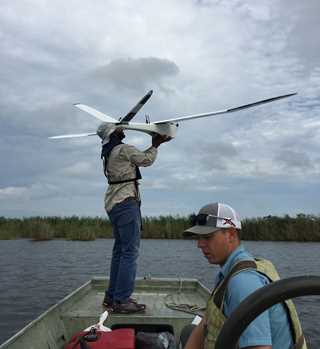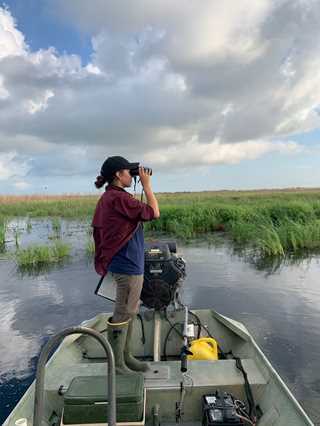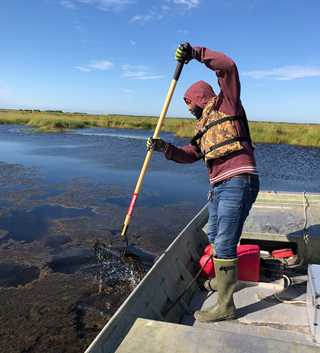Application of interdisciplinary science to improve conservation decision making
A marsh terracing example
A marsh terracing example
Our daily actions, whether related to personal interests or organizational priorities, are the results of a series of decisions, some straight-forward requiring little contemplation, with others more complex and demanding deliberate thought and periodic reflection. At our core, we strive to make good decisions-decisions that will achieve our desired outcome with maximum gain, ideally at minimum cost, whether measured in emotion, time, dollars, or otherwise. Conservation delivery decisions within Ducks Unlimited are no different, as we strive to implement the type of habitat projects in locations and manners (i.e., decisions) that yield useful gains to waterfowl populations and our supporters. Good decisions require reliable information, and that is why DU is proud to champion our reliance on the most current and advanced scientific information to help guide our decisions. In many cases, DU literally "puts our money where our mouth is" and becomes active participants and supporters of research expressly designed to answer questions about the effectiveness of habitat conservation actions. Such is the case with an ongoing partnership between DU, Mississippi State University (MSU), and Louisiana Department of Wildlife and Fisheries (LDWF) centered around an investigation into the effectiveness of marsh terracing as a restoration technique for coastal marshes in Louisiana.
Rivaled only by wetland losses in the U.S. and Canadian prairies, coastal land loss in Louisiana stands as one of the most serious threats to continentally important waterfowl habitats in North America. Since 1932, over 1.2 million acres of vegetated land has converted to open water, and these trends are projected to continue. Among the myriad marsh restoration techniques used to be combat these losses, constructed marsh terracing is one that DU and other conservation partners have delivered through numerous projects in coastal Louisiana. Marsh terracing is a technique by which on site sediments are used to construct segmented ridges of emergent marsh in open water areas of coastal wetlands. These segmented ridges, or terraces as they are called, are designed to reduce wave energy, slow marsh erosion, promote growth of submerged aquatic vegetation, and improve habitat conditions for waterfowl and other wetland organisms. Early research demonstrated favorable outcomes of marsh terracing for aquatic organisms, but those related to other intended benefits, including enhancing habitat for waterfowl, were highly variable and less certain. With funding provided by the National Academies of Sciences Gulf Research Program, DU is a proud partner in this interdisciplinary investigation seeking to improve our understanding of marsh terracing effectiveness by studying a suite of conservation outcomes over multiple years at more than 24 study sites in coastal Louisiana.
The research team; made up of 3 graduate students, 5 university professors representing 4 unique disciplines, several LDWF biologists, and multiple DU engineers and biologists; is using hydrologic modeling, satellite- and UAV-based remote sensing analysis, waterfowl and marsh bird surveys, and sampling for submerged aquatic vegetation to build a comprehensive assessment of the outcomes derived from marsh terracing. Importantly, by assessing outcomes over multiple sites, each of which vary in environmental and construction characteristics, this work will enable the research team to identify the locations, environmental characteristics, and constructions designs that yield the greatest conservation returns. This information, collected according to rigorous experimental design and scientific principles, will thus provide the foundation for improved decision making and more efficient and effective conservation by DU and our coastal restoration partners. The research team is currently entering its second and final field season. Results and recommendations are expected during late 2020.
Mike Brasher, PhD, is a Waterfowl Scientist at Ducks Unlimited Headquarters in Memphis, Tennessee.



Ducks Unlimited uses cookies to enhance your browsing experience, optimize site functionality, analyze traffic, and deliver personalized advertising through third parties. By continuing to use this site, you agree to our use of cookies. View Privacy Policy